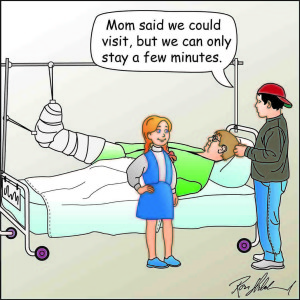 Dedicate a few minutes ahead of time to explain and instruct your child on proper behavior at a hospital. Read last month’s article on 12 Tips for the Best Hospital Etiquette, Part 1 for additional items to share with your child.
Dedicate a few minutes ahead of time to explain and instruct your child on proper behavior at a hospital. Read last month’s article on 12 Tips for the Best Hospital Etiquette, Part 1 for additional items to share with your child.
1. BEFORE THE VISIT:
Never force a child to visit someone in a hospital if the child (especially under the age of 10) does not want to go. Instead, arrange for a home sitter. It’s fine to encourage the child to go with you, but only if he or she remains under adult supervision in the main lobby or visitor’s room. Children need to feel comfortable visiting a hospital, so this is a good first step.
- Dedicate 10 minutes to brief the child who might be hesitant on what will be taking place. “We’ll be going to the hospital at 1 p.m. and staying no longer than 30 minutes” is a good way to comfort an apprehensive child.
- Explain in simple terms why the person you are visiting is in the hospital. No need to be specific; just something like, “Uncle John hurt himself in a car accident and he’s in the hospital to get better,” or “Aunt Mary had an operation to help her get better from cancer and she is recovering now.” There’s no reason to mention the severity of her cancer.
- Describe what the child will likely see and be expected to do while at the hospital, including:
- Seeing people in wheelchairs and lying in beds in rooms where the doors are slightly open. Instruct them not to stare and avert their eyes out of courtesy.
- Instruct the child to remain silent and not to make comments or ask questions within hearing range of others. He or she may ask you all the questions they want when you leave the hospital.
- Lots of medical equipment, which naturally kids will be curious about, yet they are not to excessively ask what each item is, how it operates, nor should they touch them. Perhaps set a limit of no more than two questions during the visit, conveyed quietly.
- If the patient has a meal delivered and doesn’t want it, the child should not ask to eat any of it.
- Regardless of age, explain that everyone must abide by the following general hospital courtesies:
- No running or wandering in the hallways
- No opening doors and drawers, without permission
- Speaking only in a low, quiet, almost whispering voice
- No use of cell phones and in many areas, no electronic devices of any kind
- Remind the child that she or he is expected to remain under adult supervision at all times, and that she or he is not to do anything without permission.
- Bring along a book or bag of toys with which the child can occupy his or her time.
- Instruct the child on what’s not appropriate to say to the patient, such as, “Why is Grandma looking so pale?”
- When visiting someone in a shared room, explain how the other side of the curtain is private and your child is not to touch the dividing curtain or peek to the other side.
2. DURING THE VISIT:
- Gently remind the child of all the items described above, especially ones he or she is most likely to forget, such as touching things.
- Do not force the child to hug, kiss, or touch the patient beyond their comfort level.
- Avoid giving your child any food to eat while in the room. Some medications can cause patients to become nauseous from the smell of certain foods.
3. AFTER THE VISIT:
While on the drive home, informally debrief your child by asking how he or she felt about the experience. Did anything make the child afraid to visit a hospital again? Take a few minutes to hear their immediate impressions; it may help to draw out their thoughts and overcome any bad feelings about the visit that may last a lifetime.
Happy Visiting!… Happy Holidays!
